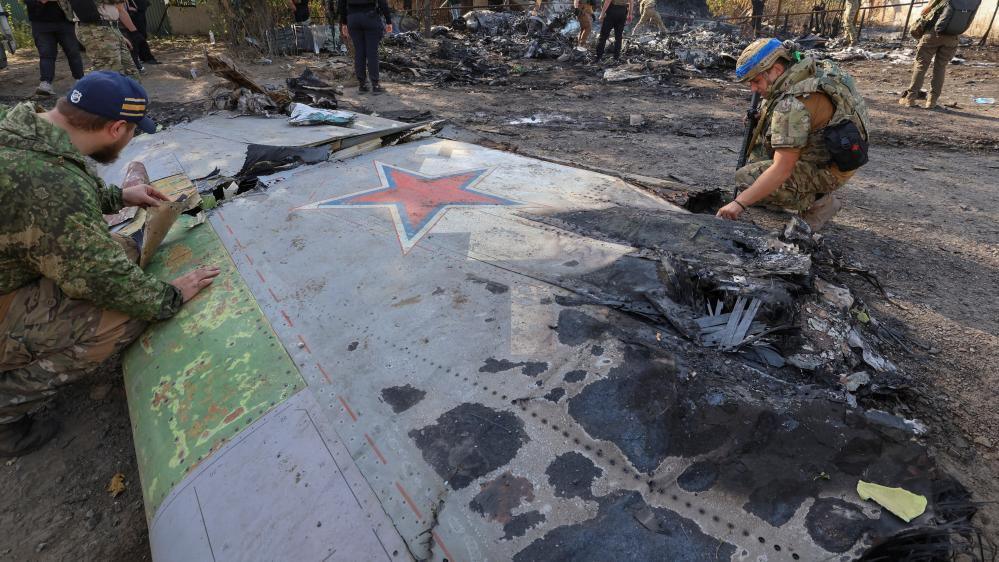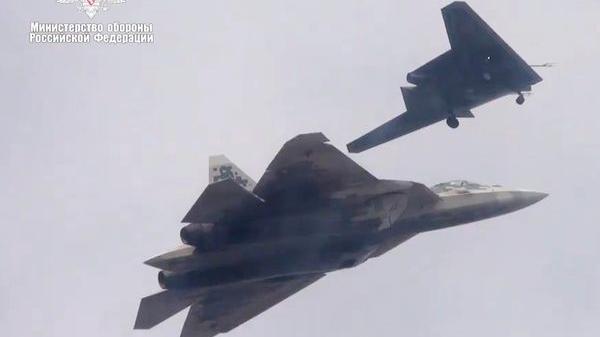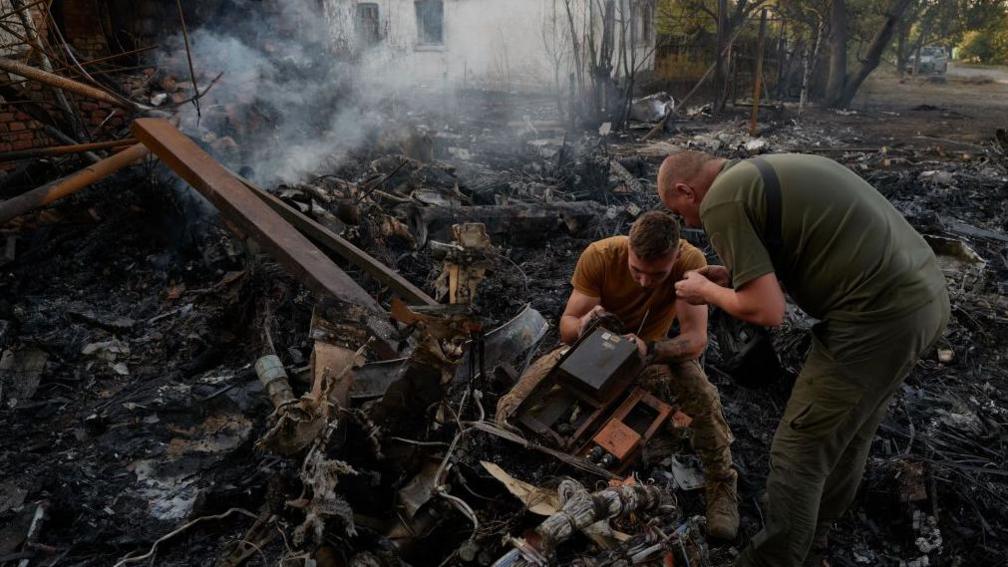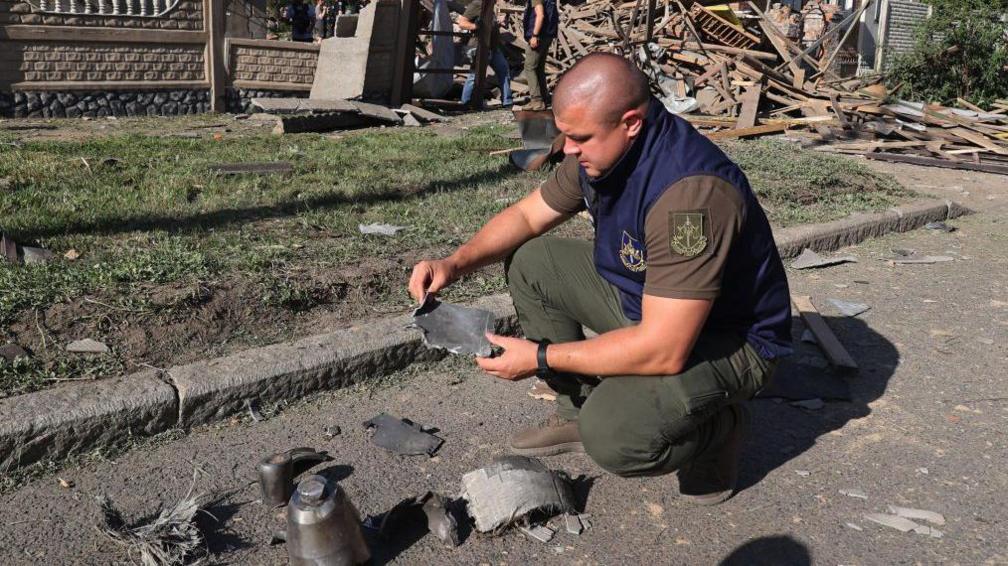Mystery of Russia's secret weapon downed in Ukraine

Wreckage of what appeared to be Russia's Okhotnik or Hunter aerial vehicle was found in Kostyantynivka
- Published
When two white vapour trails cross the sky near the front line in eastern Ukraine, it tends to mean one thing. Russian jets are about to attack.
But what happened near the city of Kostyantynivka was unprecedented. The lower trail split in two, external and a new object quickly accelerated towards the other vapour trail until they crossed and a bright orange flash lit up the sky.
Was it, as many believed, a Russian war plane shooting down another in so-called friendly fire 20km (12 miles) from the front line, or a Ukrainian jet shooting down a Russian plane?
Intrigued, Ukrainians soon found out from the fallen debris that they had just witnessed the destruction of Russian’s newest weapon - the S-70 stealth combat drone.
This is no ordinary drone. Named Okhotnik (Hunter), this heavy, unmanned vehicle is as big as a fighter jet but without a cockpit. It is very hard to detect and its developers claim it has “almost no analogy” in the world.
That all may be true, but it clearly went astray, and it appears the second trail seen on the video came from a Russian Su-57 jet, apparently chasing it down.

This old Russian defence ministry picture shows the Su-57 jet flying in tandem with an earlier version of the Okhotnik combat drone
The Russian plane may have been trying to re-establish the contact with the errant drone, but as they were both flying into a Ukrainian air defence zone, it is assumed a decision was made to destroy the Okhotnik to prevent it ending up in enemy hands.
Neither Moscow nor Kyiv have commented officially on what happened in the skies near Kostyantynivka. But analysts believe the Russians most likely lost control over their drone, possibly due to jamming by Ukraine’s electronic warfare systems.
This war has seen many drones but nothing like Russia’s S-70.
It weighs more than 20 tonnes and reputedly has a range of 6,000km (3,700 miles).

Ukrainian investigators quickly reached the scene and began inspecting the wreckage
Shaped like an arrow, it looks very similar to American X-47B, another stealth combat drone created a decade ago.
The Okhotnik is supposed to be able to carry bombs and rockets to strike both ground and aerial targets as well as conduct reconnaissance.
And, significantly, it is designed to work in conjunction with Russia’s fifth-generation Su-57 fighter jets.
It has been under development since 2012 and the first flight took place in 2019.
But until last weekend there was no evidence that it had been used in Russia’s two-and-a-half-year war in Ukraine.
Earlier this year it was reportedly spotted at the Akhtubinsk airfield in southern Russia, one of the launch sites to attack Ukraine.
So it is possible the abortive flight over Kostyantynivka was one of Moscow’s first attempts to test its new weapon in combat conditions.
Wreckage of one of Russia’s notorious long-range D-30 glide bombs was reportedly found amidst the aircraft’s crash site.

Glide bombs like this in Kharkiv have caused enormous death and destruction
These deadly weapons use satellite navigation to become even more dangerous.
So what was the Okhotnik doing flying with an Su-57 jet? According to Kyiv-based aviation expert Anatoliy Khrapchynskyi, the warplane may have transmitted a signal from a ground base to the drone to increase the extent of their operation.
The stealth drone’s failure is no doubt a big blow for Russia’s military. It was due to go into production this year but clearly the unmanned aircraft is not ready.
Four protype S-70s are thought to have been built and it is possible the one blown out of the sky over Ukraine was the most advanced of the four.
Russia's glide bombs devastating Ukraine's cities on the cheap
- Published19 May 2024
'Russians invaded my house and held a soldier captive there'
- Published11 October 2024
Even though it was destroyed, Ukrainian forces may still be able to glean valuable information about the Okhotnik.
“We may learn whether it has its own radars to find targets or whether the ammunition is pre-programmed with co-ordinates where to strike,” explains Anatoliy Khrapchysnkyi.
Just by studying images from the crash site, he believes it is clear the drone’s stealth capabilities are rather limited.
As the engine nozzle’s shape is round, he says it can be picked up by radar. The same goes for the many rivets on the aircraft which are most likely made of aluminium.
No doubt the wreckage will be pored over by Ukrainian engineers and their findings passed on to Kyiv’s Western partners.
And yet, this incident shows the Russians are not standing still, reliant on their massive human resources and conventional weapons.
They are working on new and smarter ways to fight the war. And what failed today may succeed next time.